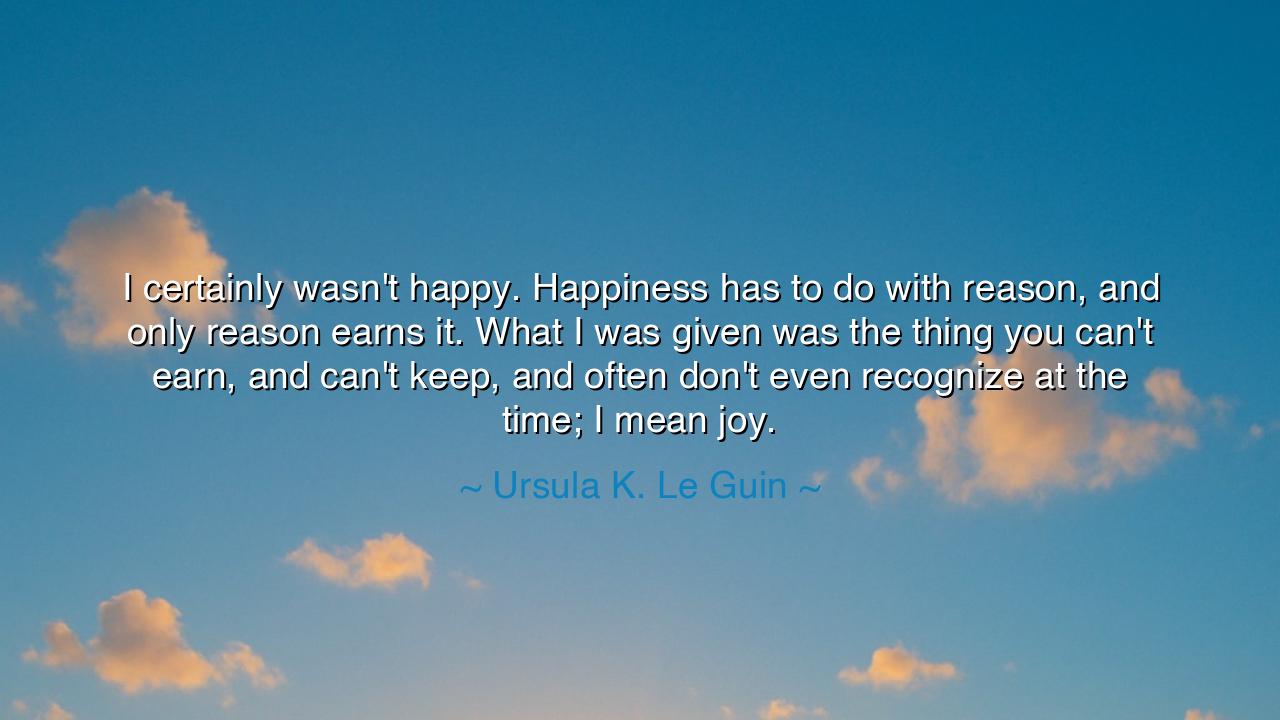
I certainly wasn't happy. Happiness has to do with reason, and
I certainly wasn't happy. Happiness has to do with reason, and only reason earns it. What I was given was the thing you can't earn, and can't keep, and often don't even recognize at the time; I mean joy.






“I certainly wasn't happy. Happiness has to do with reason, and only reason earns it. What I was given was the thing you can't earn, and can't keep, and often don't even recognize at the time; I mean joy.” Thus spoke Ursula K. Le Guin, the wise weaver of worlds, whose stories often unveiled truths too deep for the ordinary eye to see. In this passage, she draws a sacred distinction between two of the most misunderstood treasures of human existence — happiness and joy. Though they may seem kin, Le Guin reminds us that they are as different as the flame and the lightning: one steady, cultivated, earned through balance and thought; the other wild, momentary, and divine — a gift that descends unbidden, lights the soul for an instant, and vanishes before we can grasp it.
The origin of this quote lies within Le Guin’s meditations on the human spirit — likely drawn from her writings in The Left Hand of Darkness or her later essays, where she explored the deep interplay between reason, emotion, and transcendence. Le Guin, steeped in both the mythic and the philosophical, saw that the modern world often mistakes pleasure for happiness and happiness for joy. Yet to her, happiness was something rational, something we build from wisdom and alignment — the fruit of reasoned living, of harmony between thought and action. Joy, however, belongs not to the realm of the earned, but of the eternal. It is grace itself — sudden, inexplicable, and fleeting.
When Le Guin says, “Happiness has to do with reason, and only reason earns it,” she speaks to the idea that happiness requires the grounding of understanding. A man may find happiness in meaningful labor, in virtue, in friendship, and in truth. It is something cultivated through self-knowledge and moderation — the kind of peace that philosophers like Aristotle and the Stoics spoke of when they taught that happiness (or eudaimonia) is the reward of the wise. Happiness, in Le Guin’s sense, is the calm that comes when life is rightly ordered — when desire bows to discipline and thought guides the heart.
But then she draws the line of fire: “What I was given was the thing you can’t earn, and can’t keep, and often don’t even recognize at the time; I mean joy.” Here the tone changes — from the measured to the miraculous. Joy is no creation of reason; it is the visitation of something greater than man. It strikes without warning — in the laughter of a child, in a moment of beauty, in the sudden awareness of being alive beneath the open sky. It cannot be captured, for the moment one tries to hold it, it slips away like sunlight through the fingers. And yet, for that brief moment, the soul knows eternity.
Consider William Wordsworth, who once spoke of being overwhelmed by “a sense sublime of something far more deeply interfused,” when he stood amidst the mountains of the Lake District. He could not explain it, nor summon it again by will; it came and vanished like a dream. That was joy — not happiness, but something older, vaster, ineffable. It was as though, for an instant, the veil of the world had lifted, and he glimpsed the divine pattern behind all things. Le Guin’s words point to the same mystery: that joy is not a product of the mind, but a revelation of the spirit — the unearned gift of simply being.
Yet there is a paradox within her wisdom. Happiness depends on the self; joy depends on surrender. Happiness is achieved through right living, through the careful tending of one’s thoughts and deeds. Joy, on the other hand, arrives when we forget ourselves entirely. It comes when we are open — when we listen instead of control, when we see instead of seek. To chase joy is to lose it; to be still is to find it. As Le Guin says, many do not even recognize it at the time, for joy often hides beneath the ordinary, revealing itself only when we look back and realize, “I was happy then, though I did not know it.”
So, dear seeker, take this lesson to heart: live for happiness, but make room for joy. Cultivate a life of reason, of virtue, of balance — for happiness, like a garden, grows only through care. But leave space for the divine surprise — those fleeting moments of wonder that cannot be earned or owned. Do not grasp at them; simply receive them with gratitude. When joy visits you, do not ask how or why — stand still and let it burn through you.
For in the end, as Ursula K. Le Guin reminds us, reason may guide our steps, but joy gives them meaning. Happiness is the steady flame that lights the path; joy is the lightning that reveals, for one glorious heartbeat, the whole landscape of the soul. Seek not to keep it — it is not yours to hold — but remember that it exists, and that it will return. And when it does, may your heart be ready to recognize it, and bow in silent wonder before the mystery of being alive.






AAdministratorAdministrator
Welcome, honored guests. Please leave a comment, we will respond soon